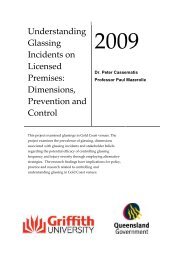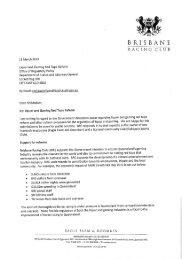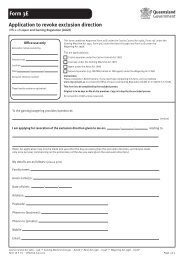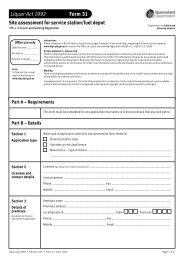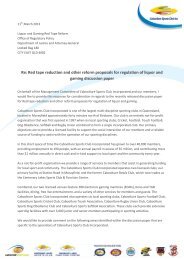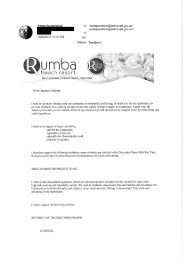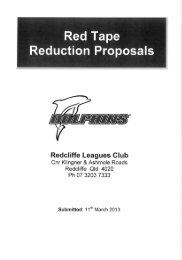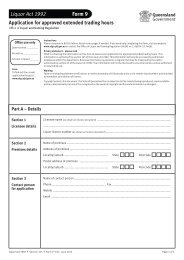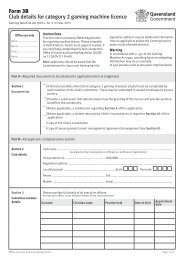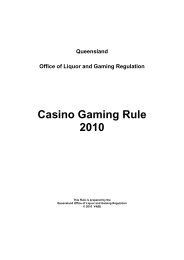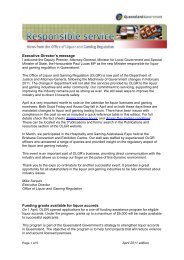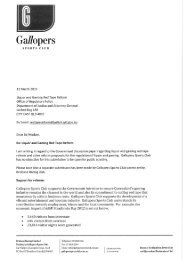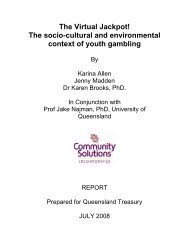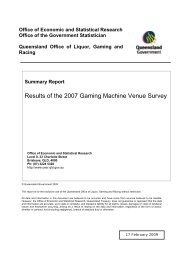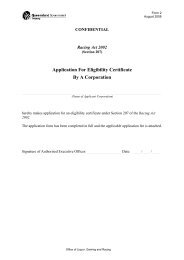Towards Best Practice for Licensed Venues - Office of Liquor ...
Towards Best Practice for Licensed Venues - Office of Liquor ...
Towards Best Practice for Licensed Venues - Office of Liquor ...
Create successful ePaper yourself
Turn your PDF publications into a flip-book with our unique Google optimized e-Paper software.
<strong>Best</strong> practice<br />
• Adopt a risk management approach to venue safety.<br />
• Establish a risk pr<strong>of</strong>ile <strong>for</strong> your venue by undertaking periodical venue safety audits that identify risks and<br />
how successfully you are addressing them.<br />
• Where the nature, size or incident history <strong>of</strong> your business warrants, engage a person qualified in risk<br />
management and experienced in undertaking risk assessments.<br />
• Implement management practices and procedures that will address safety risks specific to your venue (See<br />
Chapter 2 – Management plan).<br />
• Review incidents that occur, consider their cause, how well they were handled, whether they could have<br />
been prevented and take appropriate action.<br />
Remember<br />
• Where these best practice principles are inconsistent with a legal standard under the <strong>Liquor</strong> Act or <strong>Liquor</strong><br />
Regulation that specifically applies to your venue, including a condition <strong>of</strong> licence, then you are obligated to<br />
follow that legal standard.<br />
Implementation<br />
Instil a risk management culture:<br />
• Implement comprehensive ID checks <strong>of</strong> staff at the recruitment stage, including photographic checks.<br />
• Provide basic risk management training to venue management and key staff.<br />
• Encourage staff to identify and report potential and existing safety concerns.<br />
• Form a risk management committee or nominate a staff member to whom safety concerns and risks<br />
can be reported.<br />
• At management meetings:<br />
–include venue safety and risk review as standing agenda items<br />
–have all incidents reported and review their handling and outcome<br />
–address poor skill or behaviour levels by security or other staff.<br />
A risk management expert can help:<br />
• brief and/or train management and staff on risk management principles<br />
• prepare and/or assist with a safety audit<br />
• undertake an initial risk assessment and prepare a risk register<br />
• develop, document and implement practices and procedures on venue safety.<br />
Periodical venue safety audits should:<br />
• be conducted at higher-risk sites every six months and at other sites annually, at a minimum<br />
• be coordinated by the licensee<br />
• address all aspects <strong>of</strong> the venue’s business<br />
• be documented to assist with implementation <strong>of</strong> changes<br />
• consider the No More Risky Business Safety Audit model.<br />
When conducting the venue safety audit:<br />
• include security and other staff<br />
• consult your security firm <strong>for</strong> suggestions<br />
• talk to local licensees and/or the local liquor accord and identify problems and solutions<br />
• talk to Queensland Police and Fire and Safety Services about issues specific to your locality or premises.<br />
<strong>Towards</strong> best practice <strong>for</strong> safety in licensed venues<br />
3



